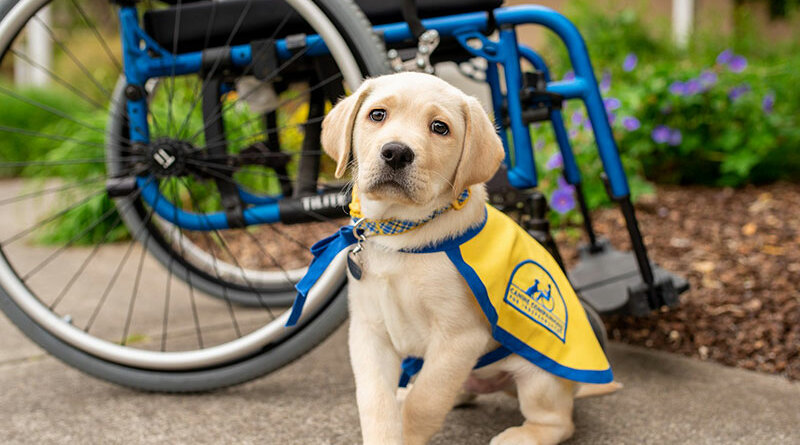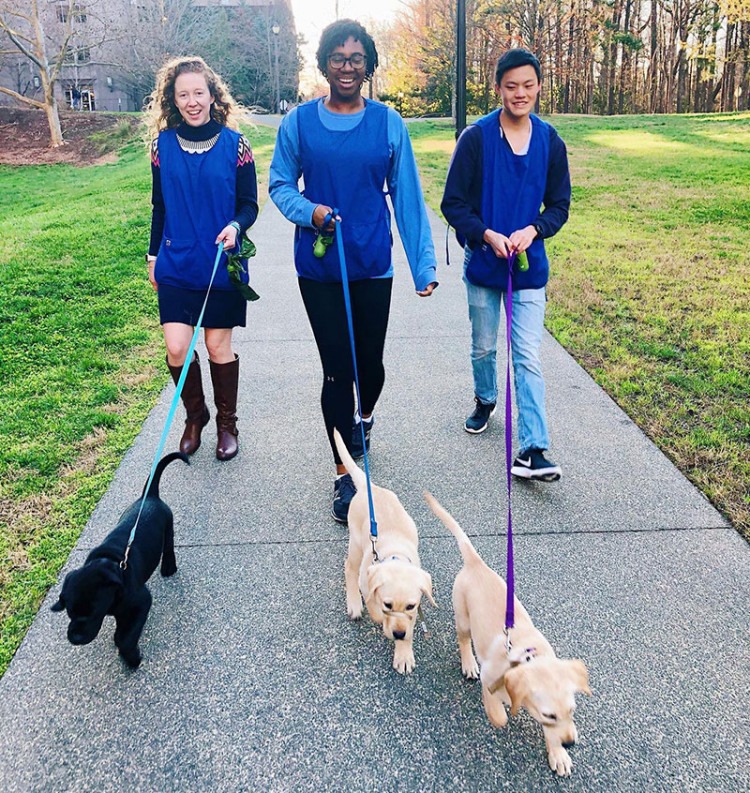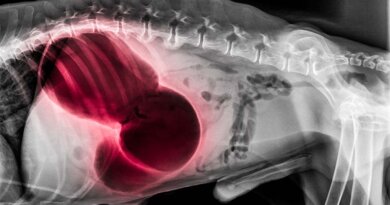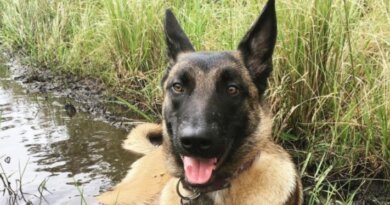Head-Start Program for Assistance Dog Puppies
Assistance dogs, regardless of breed or job, have distinct characteristics in common. Purpose-bred and selected by schools to be friendly, loyal and loving, they all have a desire to serve and please.
Many traits contribute to success: they can follow instructions but also make independent choices when necessary; focus on specific tasks but be able to generalize to new, complicated and sometimes abstract situations; recover quickly from stressful situations; overcome natural instincts to ignore other dogs, cats, wildlife and food hand-outs from strangers; and lie quietly for hours under a table or bench when not working.
Falling short on any of these complex issues can derail an assistance dog’s career. It’s no wonder that less than 50 percent of dogs bred to assist people make it to graduation. And of those, another 10 percent are returned to the school within two years, usually because the dog finds the work too stressful. Errors can be life-threating for the handler and lead to early burn-out for the dog. So, it’s vitally important to identify characteristics that may make or break a partnership, the earlier the better.
Lauded for his landmark canine cognition studies, evolutionary anthropologist and author Brian Hare, co-director and founder of the Canine Cognition Center at Duke University, is conducting a study to assess the impact of different rearing strategies on the behavior and cognitive development of assistance dogs.
GET THE BARK IN YOUR INBOX!
Sign up for our newsletter and stay in the know.
His study subjects are puppies bred by Canine Companions for Independence, a California-based nonprofit organization that provides professionally trained dogs to people with disabilities. Hare has been working with CCI for more than a decade. Their dogs are trained to assist children and adults in performing a variety of tasks, such as opening doors, picking up dropped objects, turning on lights and alerting to key sounds. The school also partners dogs with veterans suffering from PTSD.
Eight- to 10-week old pups from CCI kennels are placed in volunteer homes for 15 months. While there, they learn basic obedience, house manners and social skills. The school assists in every phase of development.
The Duke study, funded by the National Institutes of Health, is meant to compare the impact of different rearing methods on cognition during the period that’s most critical to brain development, eight to 18 weeks of age. Because he wants to know what specific social experiences pups need to be successful working dogs, Hare intensifies the socialization period during these formative weeks. The Duke puppies are raised around one another and among a stream of different people. Campus students are invited to visit the nursery, and thousands do.
Each semester, a group of eight-week-old puppies is enrolled at the Duke campus for three months, living with volunteer students, bunking at the dorm, hanging out on campus and attending what researchers call Puppy Kindergarten, where they go through up to 14 cognitive tests every two weeks from eight to 20 weeks of age.
Not unlike agility paradigms, pups are instructed to go over, around or through obstacles and make choices about how to solve novel puzzles. Will they wait for their person’s cue or follow their instincts? Will they rely on memory or solicit a little human help? Will they act on initial impulse or use new information?
Researchers evaluate self-control, problem-solving skills and communication with people. The methodology is meant to tease out cognitive approaches—the specific way a pup solves a problem.
The program isn’t an intelligence test. Nor is it a breed-analysis exam, because individuals within a breed have different personalities. Rather, the research team wants to sort out the independent thinkers from the team players, and the generalists from the specialist. They’re looking for the thinkers whose problem-solving skills can predict future success.
Part of any behavior study, whether with mice or non-human primates, is measuring, quantifying and evaluating outcomes so that findings can be applied to real life. If the Duke researchers achieve their goal, their results will enable trainers to predict success in very young dogs long before they enter the two-year program.
Knowing what a dog’s innate skills are at three months will help CCI, because the school can spend more time on potential canine candidates and less money on each team they produce. Dogs not suited for the work could be rehomed earlier with one of the lucky families who have been on a long list waiting to adopt the career-change dogs.
This landmark research promises a brighter future for all the dogs, as well as those with whom they will eventually be partnered or rehomed.






It?¦s actually a great and helpful piece of information. I?¦m glad that you just shared this helpful information with us. Please keep us informed like this. Thank you for sharing.
I like this post, enjoyed this one thank you for putting up. “The universe is not hostile, nor yet is it unfriendly. It is simply indifferent.” by John Andrew Holmes.
Thanks a bunch for sharing this with all people you actually understand what you’re speaking approximately! Bookmarked. Kindly also talk over with my website =). We will have a hyperlink exchange contract between us!
I am not rattling great with English but I line up this real easy to understand.
What i do not understood is if truth be told how you are now not actually much more smartly-favored than you might be right now. You are very intelligent. You understand therefore significantly on the subject of this subject, made me personally believe it from a lot of numerous angles. Its like women and men don’t seem to be involved unless it is one thing to accomplish with Lady gaga! Your personal stuffs nice. All the time take care of it up!
Very interesting info!Perfect just what I was looking for!